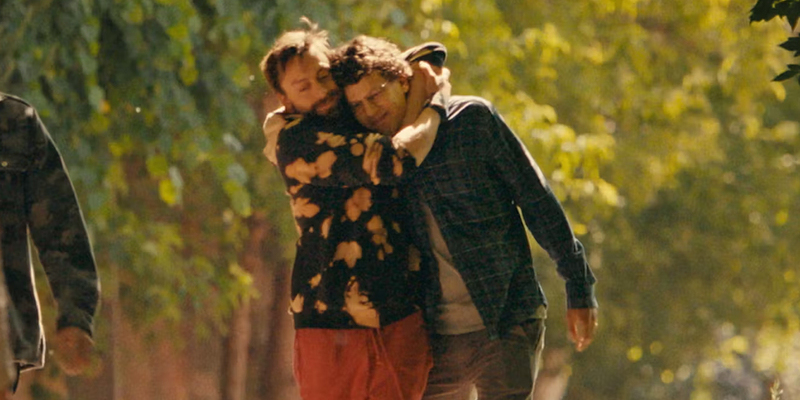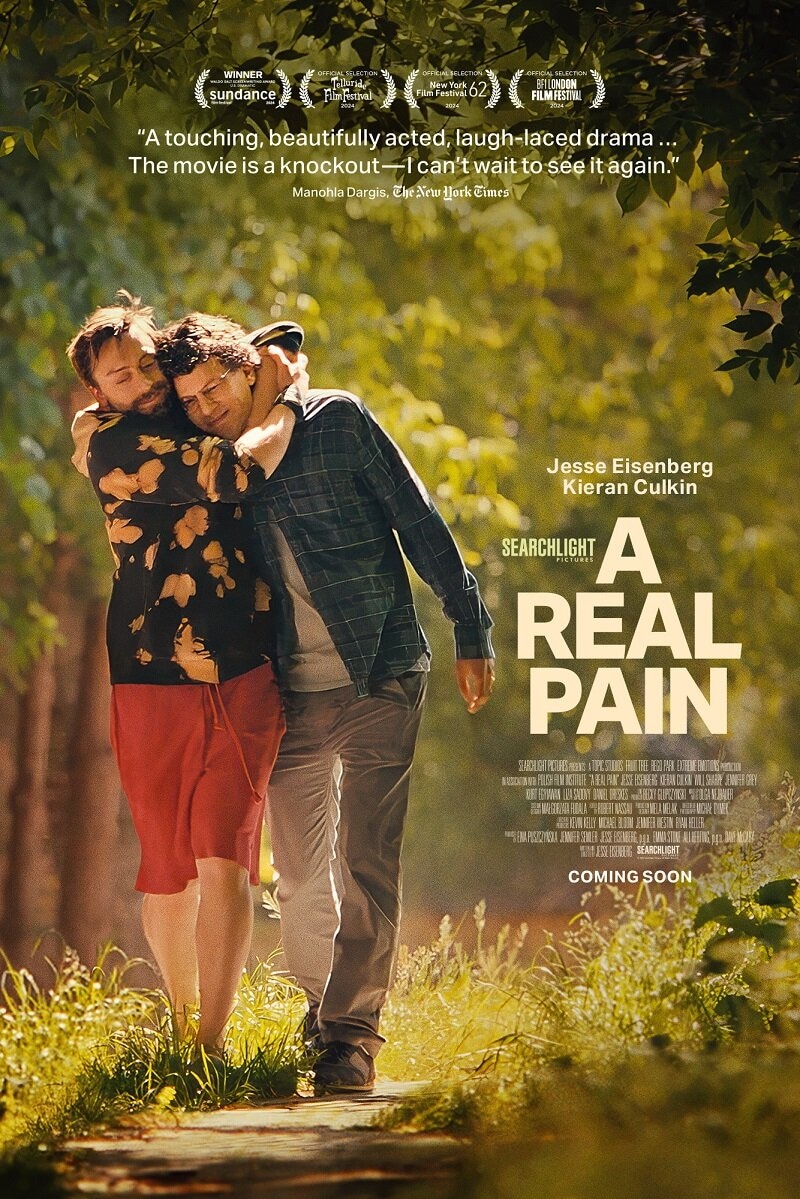
To honour their late grandmother's wishes, two Jewish cousins unite for a
tense tour of their ancestral homeland of Poland.
Review by
Eric Hillis
Directed by: Jesse Eisenberg
Starring: Jesse Eisenberg, Kieran Culkin, Jennifer Grey, Will Sharpe, Kurt Egyiawan, Liza Sadovy, Daniel Oreskes

"Planes, Trains and Concentration Camps" could serve as an alternative
title for A Real Pain, Jesse Eisenberg's second feature as writer/director. Like
John Hughes' comedy it pairs two mismatched men on a road trip. One is
boisterous to the point of being obnoxious while the other is self-serious
and reserved and just wants to get back to his family. The trip here
doesn't take in America's Eastern seaboard and MidWest but rather some of
the key Polish locations of the Holocaust, but it's as laugh out loud
funny as any Hope and Crosby road movie.

Following the passing of their beloved grandmother, who survived the
Holocaust and fled Poland for New York, cousins David (Eisenberg) and
Benji (Kieran Culkin) embark on a pilgrimage to visit her childhood
home in the old country (the house they ultimately visit is the real life
childhood home of Eisenberg's own Holocaust-surviving grandmother). Before
that they will join a Jewish history tour lead by James (a sublime Will Sharpe), a gentile Brit who professes a profound interest in "the Jewish
experience" but is quietly self-conscious of his status as a cultural
interloper. Also on the tour is wealthy divorcee Marcia (Jennifer Grey); retired couple Diane (Liza Sadovy) and Mark (Daniel Oreskes); and Eloge (Kurt Egyiawan), a survivor of the Rwandan genocide who converted
to Judaism after being embraced by the Jewish community of his adopted
home of Winnipeg, and ironically the only member of the group who seems
in touch with their faith.
Eisenberg's David is the Steve Martin surrogate here, stiff as a board
and proud of living a very adult life with a good job, a wife and a
child. Culkin's Benji is the John Candy figure: a jobless free-wheeler
who lacks a filter, he's the sort of person who can offend someone and
subsequently become their new best friend in the space of minutes. Once
inseparable, the two cousins have gone their separate ways in recent
years, a parting that appears to have stung Benji far more than David.
Aware of David's guilt over not keeping in touch, Benji purposely prods
his cousin's anxieties, embarrassing him in front of the tour group and
dragging him to hotel roofs to share a joint. As the tour progresses
Benji becomes increasingly unstable, causing offence and mortifying
David. But it becomes clear that Benji is deeply troubled, and that the
loss of his grandmother has triggered a profound sadness within
him.

The odd couple pairing of David and Benji seems initially like an
obvious road movie trope but Eisenberg uses his inharmonious
protagonists to examine the ways in which descendants of persecuted
peoples negotiate the modern world. David is the "model minority" who
keeps his heritage at a distance and integrates into society without
complaining about his lot. Benji on the other hand is keen to own the
pain he has inherited, even if it makes others uncomfortable like when
he points out the irony of Jews travelling first class on a train in
Poland or when he suggests James has no connection to Jewish culture
other than the facts and figures he trots out on each stop of the tour.
Benji is the sort of minority that makes white Christians anxious, for
if he still carries the trauma of his predecessors shouldn't we carry
the guilt of ours?
Eisenberg and Culkin deliver sublime portrayals of two men who have
chosen different ways to deal with their inherited grief, each jealous
in some way of the path the other has been able to take. Loner Benji can
light up a room but is ultimately alone in the world while David
struggles to connect with strangers yet has acquired himself a loving
wife and son. They both think they want the other's perceived gifts, but
do they really? The cousins are made anxious by their mutual presence
and yet we get the sense that they're the only people in the world who
really understand each other.

Eisenberg also uses his comedy to interrogate the notion of what
constitutes an appropriate way to honour the past. With a grim movie
about the Holocaust having become almost an annual tradition around
awards time, we're in danger of becoming numb to the point of such
movies, and many of us are guilty of kneejerk "Not another Holocaust
movie" reactions. In a very Jewish way, Eisenberg suggests that maybe
comedy is the best way to honour the dead; that maybe there's nothing
wrong with cracking a joke while visiting a site of historical horror;
that maybe it's actually the ultimate way of letting the bastards know
that despite their best efforts to wipe out your people, here you stand,
the unremarkable American grandson of a remarkable Polish woman. This
comedy, with its sunny lighting and witty repartee, just might make you
think about the Holocaust and its echoes in more profound ways than any
well-intentioned black and white concentration camp drama.

A Real Pain is on UK/ROI
VOD now.

